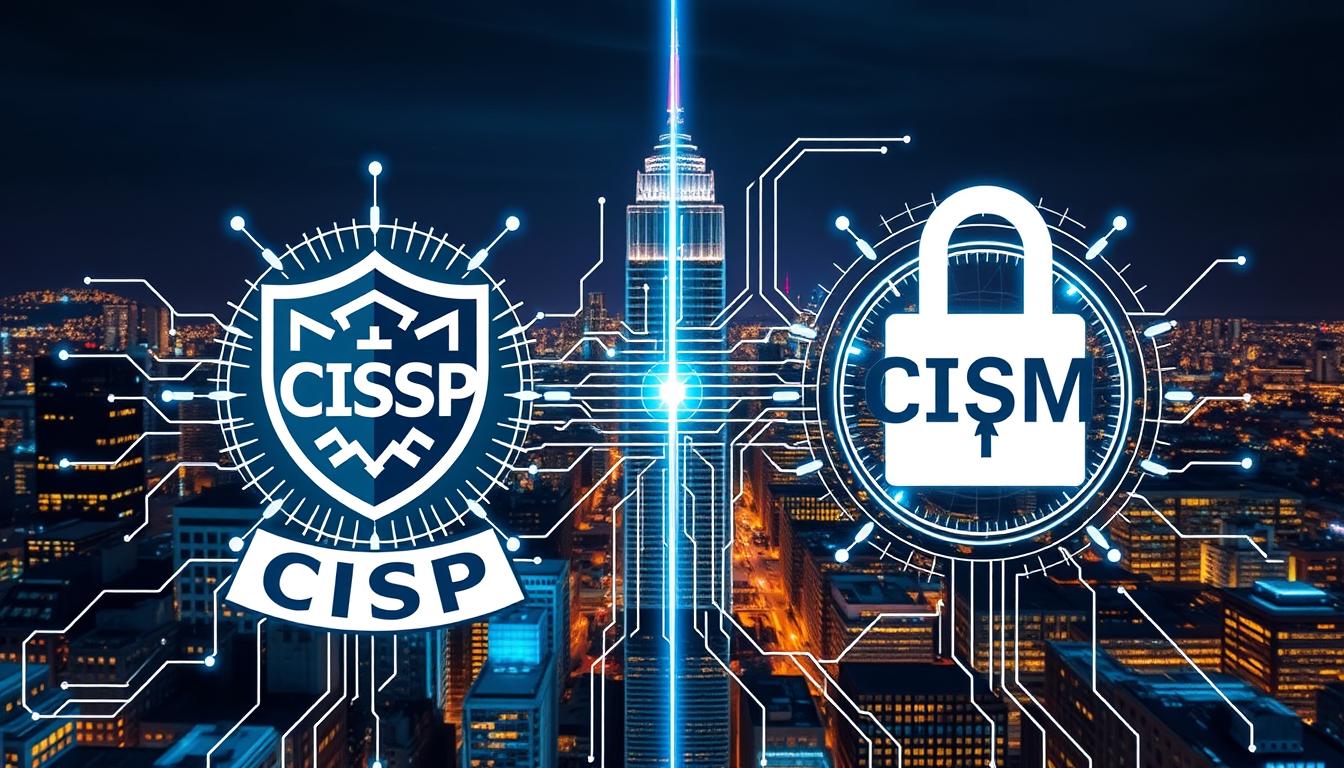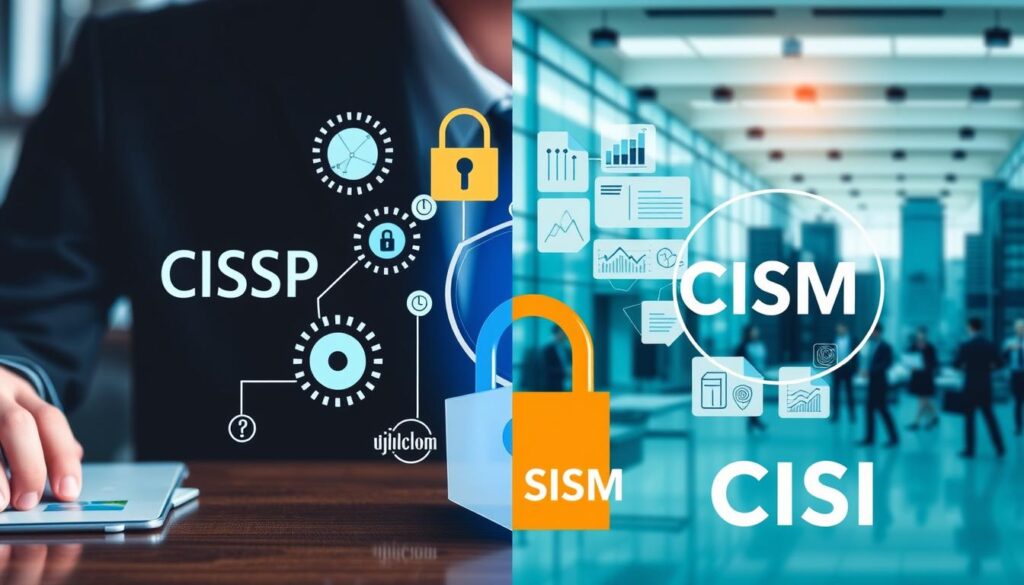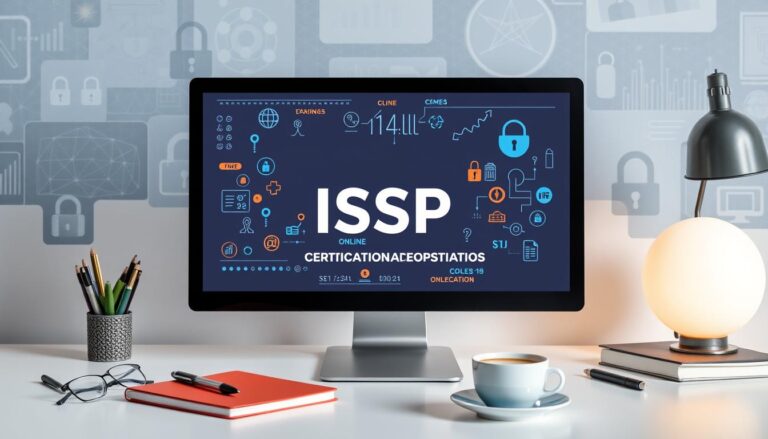
Introduction
Did you know over 4 million cybersecurity jobs were open worldwide in 2023? This shows a big need for certified experts. You might be thinking about which path to take in your career. This could be between the Certified Information Systems Security Professional (CISSP) or the Certified Information Security Manager (CISM) certification.
Both certifications are important in the cybersecurity world. They serve different roles. It’s key to pick the right one for your career goals.
As cyber threats grow, companies need experts with special skills. Knowing the differences between CISSP and CISM is important. It helps you choose the right path for your career.
Introduction
The world of cybersecurity is changing fast. This means professionals need to keep their skills sharp. Two top certifications are CISSP (Certified Information Systems Security Professional) and CISM (Certified Information Security Manager). Both are well-respected and require a lot of time and effort.
As cyber threats get more complex, getting a CISSP or CISM can help you reach your cybersecurity career goals. This guide will compare CISM to help you choose the right path. Knowing what each certification offers is key to making the right choice.
Both certifications need at least five years of experience and ongoing education to stay current. CISSP covers a wide range of topics in eight domains. CISM, on the other hand, focuses on management in information security. Understanding these differences helps you make smart choices for your career.
What is CISSP?
The Certified Information Systems Security Professional (CISSP) certification is a big deal in information security. It’s offered by (ISC)² and is known worldwide. It shows you can create and manage strong security programs.
Earning the CISSP proves you’re good at designing and managing security in different places. It’s a sign of your skill in keeping information safe.
Overview of CISSP Certification
The CISSP certification has a tough exam that tests your knowledge in key areas of security. It focuses on using what you know in real situations. This means you need to understand both technical and leadership parts of cybersecurity.
There are over 136,000 people worldwide with the CISSP. They get a lot of respect and trust in the cybersecurity field. It’s a key part of the industry.
Key Domains of Knowledge
The CISSP covers eight main areas. These areas show what you need to know to manage information security well. The main domains are:
- Security and Risk Management: 15%
- Asset Security: 10%
- Security Architecture and Engineering: 13%
- Communication and Network Security: 13%
- Identity and Access Management: 13%
- Security Assessment and Testing: 12%
- Security Operations: 13%
- Software Development Security: 11%
Knowing these areas well helps you face the digital world’s challenges. It makes you a key player in any team looking to improve its security.
What is CISM?
The Certified Information Security Manager (CISM) certification is all about managing information security. It’s offered by ISACA and is for IT pros who manage security in companies. Getting a CISM shows you’re good at managing risks, setting up security rules, and handling security issues.
Overview of CISM Certification
This certification is for those who focus on security management. It shows you can handle a company’s security program well. To get it, you need at least five years of experience in security, with three years in management roles. This helps you move up in cybersecurity jobs.
Core Areas Covered in CISM
CISM covers four key areas for managing information security:
- Information Security Governance: Creating a plan to manage and control security.
- Information Security Risk Management: Finding and handling risks to information assets.
- Information Security Program Development and Management: Building and keeping security programs that match company goals.
- Information Security Incident Management: Handling and reducing security problems to protect company assets.
CISM focuses on governance and program development. This makes it great for those wanting to grow in cybersecurity management.
CISSP vs CISM: Key Differences
When looking at CISSP vs CISM, knowing the eligibility and exam format is key. Both need a lot of work experience. But they focus on different areas and have different structures.
Eligibility Requirements
To get a CISSP, you need five years of paid work in at least two CISSP domains. If you have a four-year degree, you can skip one year of experience. For CISM, you need five years in information security management, with three years in related fields.
Exam Format and Structure
The CISSP exam is six hours long with 250 questions. You need a score of 700 out of 1000 to pass. It’s taken at Pearson VUE Testing Centers.
The CISM exam is four hours with 150 questions. You must score 450 or higher to pass. CISM offers both in-person and remote testing, giving candidates more options.

CISSP vs CISM: Exam Difficulty
It’s important to know how hard the CISSP and CISM exams are. The CISSP covers a lot of topics, making it tough. It has eight domains and requires at least five years of experience. This makes the CISSP exam very broad.
Preparation Strategies for CISSP
To do well on the CISSP exam, follow these steps:
- Dive into each domain: Learn the details of each of the eight domains.
- Utilize study materials: Use official books and online tools made for CISSP prep.
- Practice with mock exams: Take practice tests to get used to the exam style.
Preparation Strategies for CISM
For the CISM exam, focus on management and governance. Here’s how to prepare:
- Engage with CISM resources: Use CISM-specific materials to learn about governance and risk.
- Join study groups: Working with others can help you understand and remember important ideas.
- Gain practical experience: Do hands-on work in information security governance and incident management.
CISSP vs CISM: Career Pathways
It’s key to know the career paths for CISSP and CISM professionals. Both certifications are valuable in cybersecurity. But, they lead to different roles and duties.
Roles Associated with CISSP Certification
CISSP opens doors to many cybersecurity jobs. These jobs need technical skills and broad knowledge. Some common roles include:
- Information Security Manager
- Chief Information Security Officer (CISO)
- Security Consultant
- Network Security Engineer
- Security Architect
CISSP roles require deep knowledge of security areas. As threats grow, CISSP holders are sought for their skill in security solutions.
Roles Associated with CISM Certification
CISM is for those in management and leadership in info security. Common CISM roles are:
- Information Security Manager
- IT Security Consultant
- Chief Information Security Officer (CISO)
- Security Risk Manager
- Compliance Manager
CISM holders focus on governance, risk, and strategy in cybersecurity. This cert helps you move into leadership, guiding in security strategies.
| Certification | Typical Roles | Focus Areas |
|---|---|---|
| CISSP |
|
Technical expertise in multiple security domains |
| CISM |
|
Management, governance, risk management |
Understanding these paths helps you pick the right certification for your cybersecurity career.
CISSP vs CISM: Salary Expectations
In the world of cybersecurity, how much you earn is key to your career path. Getting certifications like CISSP and CISM boosts your skills and pay. The salaries for these certifications show how in-demand cybersecurity experts are.
Average Salary for CISSP Professionals
CISSP-certified folks in North America make over $130,000 a year. They have a wide range of technical skills, which means they earn more than others. Having CISSP can lead to better job satisfaction and higher pay, with a 25% salary boost.
About 87% of CISSP holders are very happy with their jobs. This shows how valuable the certification is in the job market.
Average Salary for CISM Professionals
CISM-certified people earn around $122,000 a year. While it’s a bit less than CISSP, it opens doors to top management jobs in cybersecurity. CISM holders see a 20% salary increase over non-certified peers.
Around 82% of CISM holders are content with their jobs. This highlights the benefits of getting this certification. Both CISSP and CISM help careers grow and bring in more money.
| Certification | Average Salary (Annually) | Salary Premium (%) | Job Satisfaction (%) |
|---|---|---|---|
| CISSP | $130,000 | 25% | 87% |
| CISM | $122,000 | 20% | 82% |
Industry Recognition of CISSP and CISM
Knowing how CISSP and CISM are seen in the industry is key to choosing your career path. Both are respected in cybersecurity, showing the skills of those who hold them. This is true all over the world.
Global Acceptance of CISSP Certification
The CISSP certification is well-known in cybersecurity. Employers everywhere see it as top-notch, with over 140,000 holders. It’s more than a badge; it shows deep knowledge in info security.
It opens doors to great jobs, with over 9,700 CISSP job ads on SimplyHired. CISSP holders earn about $120,000 a year. This shows how much value employers put on them.
Global Acceptance of CISM Certification
CISM is quickly becoming a big deal, thanks to its focus on cybersecurity and business. Over 32,000 people worldwide have it. It’s known for its strong focus on managing risks in info security.
This makes it attractive to employers who want people who can handle security challenges. In the U.S., CISM holders make about $105,926 on average. This shows it’s a highly respected certification in cybersecurity.

| Certification | Global Professionals | U.S. Average Salary | Job Postings |
|---|---|---|---|
| CISSP | 140,000+ | $120,000 | 9,700 |
| CISM | 32,000+ | $105,926 | N/A |
Both CISSP and CISM offer big benefits for your cybersecurity career. Knowing what each offers can help you make a smart choice for your future.
Benefits of Earning CISSP Certification
Getting CISSP certification brings many benefits of CISSP that can change your career in cybersecurity. It shows you know a lot about important cybersecurity areas. This makes you known and trusted by employers worldwide.
The CISSP certification advantages also mean better job chances and more money. Jobs that need CISSP often pay 10-20% more than jobs without it. You’ll stand out more in a changing job world.
- Security Architect
- Chief Information Security Officer (CISO)
- Cybersecurity Analyst
- Security Consultant
- Network Security Engineer
Also, getting CISSP can help you move up in your cybersecurity career advancements. Surveys show certified people are 20% more likely to get promoted. This boosts your reputation and makes you more competitive in the job market.
The table below shows important CISSP certification benefits:
| Aspect | Details |
|---|---|
| Global Recognition | Seen as the top in cybersecurity. |
| Earning More | Usually earns 10-20% more than non-certified. |
| Advancing in Career | 20% more chance to get promoted. |
| More Job Choices | Opens doors to many roles, from Security Architect to CISO. |
In short, getting CISSP certification greatly improves your career in cybersecurity. It opens doors to better jobs and more money.
Benefits of Earning CISM Certification
The CISM certification brings many benefits for those looking to grow in cybersecurity management. It opens up new career paths and proves your skills in managing information security. This is key for those in the field.
Getting CISM certified means you can:
- Advance your career with a globally recognized credential showing you’re good at managing information security.
- Stand out in the job market. CISM shows you have the knowledge employers want.
- Make better strategic decisions. You’ll learn about risk, incident management, and governance.
- Find more job opportunities. You can aim for roles like Information Security Manager or CISO.
- Get paid more. CISM shows you’re an expert, so you can earn higher salaries.
Also, CISM training teaches you valuable skills. These skills are essential for managing information security well.
| Core Areas | Description |
|---|---|
| Information Security Governance | Creates and keeps an organization’s information security plan in place. |
| Information Risk Management | Finds, checks, and reduces risks to information security. |
| Information Security Program Development and Management | Develops and manages security programs that match business goals. |
| Information Security Incident Management | Prepares for and handles information security incidents to reduce impact. |
In summary, CISM certification greatly helps your career and your organization’s cybersecurity. It’s not just a certification; it’s a strategic edge in a tough field.
Conclusion
In this look at CISSP vs CISM certifications, you’ve learned a lot. This knowledge can help guide your career in the fast-changing world of cybersecurity. Both certifications are valuable, fitting different career paths.
If you’re aiming for a role in management, like governance and risk, CISM might be better. On the other hand, CISSP is great for those who want to dive into the technical side of security.
When deciding, think about what each exam requires. Both need at least five years of experience in the field. But they focus on different areas of expertise.
Remember, getting certified can lead to higher pay and career growth. Studies show over 15% of professionals see a big increase in their earnings after getting certified. This highlights the importance of picking the right certification for your career goals.
Choosing between CISSP and CISM depends on your career goals, experience, and skills you want to improve. Whether you focus on CISSP’s technical aspects or CISM’s managerial side, getting certified will boost your career. It will make you a key player in the cybersecurity world.
Make your choice carefully. It will greatly influence your career growth and success in the field of cybersecurity.
Source Links
- CISSP vs CISM: Which Security Certification Should You Get?
- CISM vs CISSP: The Ultimate Comparison 2024 💡
- Unveiling the Titans of Cybersecurity: CISSP vs CISM
- CISM versus CISSP – which certification suits you better? | Skillsoft’s Global Knowledge
- CISSP versus the CISM Certification |ISC2
- CISM vs CISSP: Which Certification is Right for You
- CISM vs CISSP: Which Security Certification is Right for You? – Spiceworks
- CISM vs CISSP: Which One Is Right for Your Career?
- CISM vs CISSP: Which Certification Is Best for You?
- CISA vs CISM vs CISSP Certification: What Are the Differences and Which One Is Best For Me? | Cybrary
- CISM vs CISSP: Which IT Security Certification is Best in 2024?
- CISM vs CISSP: Key Differences and Which One to Choose in 2025
- CISM vs. CISSP: Which certification should you get? | Essential information
- Cybersecurity manager certifications compared: CISSP, CIPM, CISM, GSLC
- 7 Key Differences: CISM vs CISA vs CISSP – Which Is Right for You? – ISACA Prep
- CISSP vs CISM: Salary Comparisons and Career Opportunities
- CISSP vs CISM vs CISA: Key Differences and Similarities
- 20+ IT Certifications with the Highest Pay
- Choosing the Right Security Certifications: CISSP vs CISM, CISA and CRISC
- CISSP, CISM, CISA: What’s the Difference Between Security Certifications?
- Scaling the Peaks: CISSP vs CISM – Choosing the Right Certification Path | Sapience Consulting
- CISM vs CISSP: Choosing the Right Path for Cybersecurity Excellence
- CISM vs CISSP: Where to Start?



